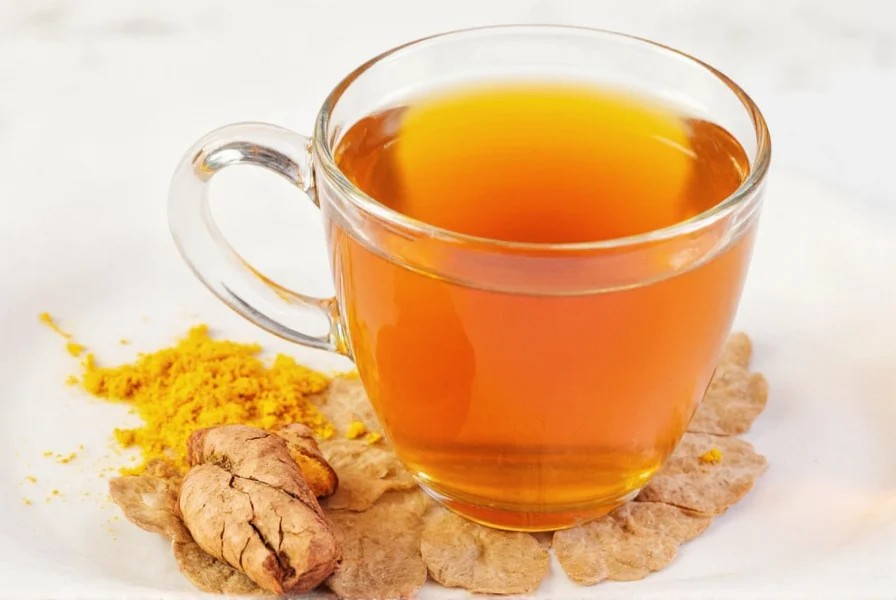Combining tea and turmeric creates a powerful wellness beverage that has gained popularity for its numerous health advantages. This golden-hued drink blends the traditional medicinal properties of turmeric with the comforting ritual of tea drinking. Understanding the proper preparation methods and realistic health expectations is crucial for maximizing benefits while avoiding common misconceptions about this ancient remedy.
The Science-Backed Health Benefits of Turmeric Tea
Turmeric contains curcumin, a polyphenol with potent anti-inflammatory and antioxidant properties. Research published in Advances in Experimental Medicine and Biology indicates curcumin may help reduce inflammation markers in the body. When preparing turmeric tea for inflammation support, adding a pinch of black pepper increases curcumin absorption by up to 2,000% due to piperine content.
Regular consumption of properly prepared turmeric tea may support:
- Joint health and mobility through reduced inflammatory responses
- Immune system regulation via modulation of immune cell activity
- Digestive comfort by stimulating bile production
- Skin health through antioxidant protection against free radicals
It's important to note that while turmeric tea offers potential health benefits, it shouldn't replace medical treatment for serious conditions. The concentration of curcumin in homemade tea is significantly lower than therapeutic supplements.

Traditional Turmeric Tea Preparation Methods
Creating effective turmeric tea requires attention to preparation details that maximize curcumin bioavailability. The traditional method involves simmering rather than steeping to properly extract compounds:
| Ingredient | Amount | Purpose |
|---|---|---|
| Fresh turmeric root | 1-inch piece, grated | Higher curcumin content than powder |
| Black pepper | 1/8 teaspoon | Enhances curcumin absorption |
| Healthy fat | 1/2 teaspoon coconut oil | Curcumin is fat-soluble |
| Water | 2 cups | Base liquid |
Basic preparation: Simmer grated turmeric in water for 10-15 minutes (not just steeping), add black pepper and healthy fat during the last 5 minutes, then strain. Adding lemon juice can enhance antioxidant availability while providing flavor balance.
Popular Turmeric Tea Variations and Recipes
While traditional turmeric tea uses only turmeric root, modern variations incorporate complementary ingredients for enhanced flavor and additional benefits:
Golden Milk Tea
This popular variation combines turmeric tea with milk alternatives. For an authentic golden milk tea recipe, simmer 1 cup of unsweetened almond milk with 1/2 teaspoon turmeric powder, 1/4 teaspoon cinnamon, small ginger slice, and a pinch of black pepper. The addition of cinnamon provides complementary anti-inflammatory compounds while balancing turmeric's earthy flavor.
Citrus-Infused Turmeric Tea
Adding lemon or orange to turmeric tea creates a refreshing beverage rich in vitamin C. The citric acid helps preserve curcumin's stability while providing complementary antioxidant benefits. This variation works particularly well as an afternoon pick-me-up without caffeine.

Timing and Consumption Guidelines
Understanding the best time to drink turmeric tea maximizes its potential benefits. Many wellness experts recommend consuming turmeric tea:
- 30 minutes before meals to support digestion
- In the evening to potentially support restful sleep (though avoid late evening if sensitive to spices)
- After physical activity to support recovery processes
For optimal absorption, consume turmeric tea with a small amount of healthy fat. The recommended daily intake of curcumin from dietary sources like tea typically ranges from 50-500mg, which translates to 1-3 cups of properly prepared turmeric tea daily.
Potential Considerations and Side Effects
While turmeric tea is generally safe for most people, certain considerations should be noted. Turmeric tea side effects may include gastrointestinal discomfort in sensitive individuals, particularly when consumed in large quantities. Those taking blood-thinning medications should consult healthcare providers before regular consumption, as turmeric may enhance anticoagulant effects.
Pregnant women should moderate intake, as high doses of turmeric may stimulate uterine contractions. Individuals with gallbladder issues should also exercise caution, as turmeric may increase bile production. Always start with small amounts to assess tolerance when beginning regular turmeric tea consumption.
Realistic Expectations for Wellness Benefits
It's crucial to maintain realistic expectations about turmeric tea benefits. While research shows promising results for curcumin's anti-inflammatory properties, the concentration in tea is significantly lower than in clinical studies using supplements. Turmeric tea works best as part of a comprehensive wellness approach rather than a standalone solution.
Does turmeric tea help with weight loss? While some studies suggest curcumin may support metabolic health, turmeric tea alone won't produce significant weight loss. It may complement weight management efforts when combined with proper nutrition and exercise, but shouldn't be viewed as a weight loss solution.
Frequently Asked Questions
What are the primary health benefits of drinking turmeric tea regularly?
Regular consumption of properly prepared turmeric tea may provide anti-inflammatory effects, support immune function, aid digestion, and offer antioxidant protection. The curcumin in turmeric has been studied for its potential to reduce inflammation markers, though the concentration in tea is lower than therapeutic supplements. For optimal benefits, always include black pepper and a healthy fat to enhance curcumin absorption.
How much turmeric should I use when making tea for maximum benefits?
For optimal benefits, use 1 inch of fresh grated turmeric root or 1/2 to 1 teaspoon of high-quality turmeric powder per 2 cups of water. Fresh turmeric generally contains higher curcumin levels than powdered. Remember to simmer (not just steep) for 10-15 minutes and add a pinch of black pepper plus a small amount of healthy fat like coconut oil to maximize absorption of the active compounds.
Can I drink turmeric tea every day, and are there any long-term concerns?
Most people can safely enjoy 1-3 cups of turmeric tea daily as part of a balanced diet. Long-term consumption at moderate levels is generally well-tolerated, though some may experience mild digestive upset. Those with gallbladder issues, taking blood thinners, or who are pregnant should consult healthcare providers before regular consumption. Always start with smaller amounts to assess your tolerance before establishing a daily routine.
What's the best time of day to drink turmeric tea for specific health goals?
For digestive support, drink 30 minutes before meals. For potential sleep benefits, consume in the early evening (avoiding late evening for spice-sensitive individuals). Post-workout consumption may support recovery processes. The best time to drink turmeric tea depends on your specific wellness goals, but consistency matters more than precise timing for most general health benefits.











 浙公网安备
33010002000092号
浙公网安备
33010002000092号 浙B2-20120091-4
浙B2-20120091-4